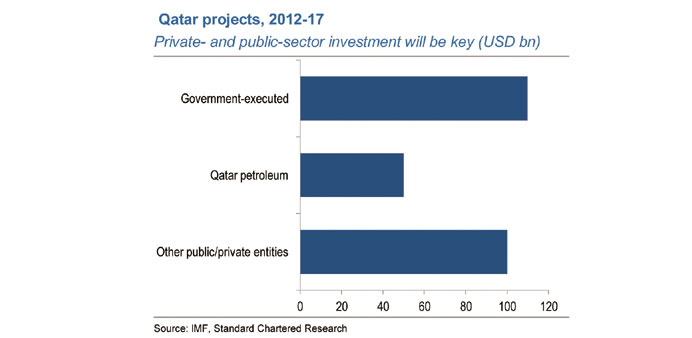After an era of LNG-led double-digit growth, Qatar is entering a more moderate growth phase that will likely be driven by the non-hydrocarbon sector as it prepares to host the 2022 World Cup, says Standard Chartered.
Standard Chartered sees a “stable credit outlook” on Qatar, which the bank said is a reflection of the country’s dominant position in the global liquid natural gas (LNG) market.
Buoyed by a strong hydrocarbon sector, Qatar has built up significant external and fiscal cushions, Standard Chartered said in a report.
“While gas-market dynamics are changing, we do not foresee an immediate threat to Qatar’s strong credit metrics, particularly given its very low cost of production. After an era of LNG-led double-digit growth, Qatar is entering a more moderate growth phase that will likely be driven by the non-hydrocarbon sector as it prepares to host the 2022 World Cup,” Standard Chartered said.
Following years of heavy international borrowing to build hydrocarbon infrastructure, Qatar’s focus is now on maintaining a conservative leverage stance and developing the local debt market.
“Strong fundamentals and a lack of supply have supported Qatar’s sovereign spreads, making this a fairly defensive segment. That said, we no longer see a strong relative-value argument in support of Qatar sovereign paper on a rating-adjusted basis. Qatari financials and quasi-sovereign bonds offer better value, in our view,” the report said.
According to Standard Chartered, Qatar’s delivery of FIFA 2022 infrastructure was slow in H2, 2013. The awarding of contracts related to the World Cup now looks likely to happen this year rather than in 2015.
Qatar awarded the first stadium project in April 2014, which involves renovating and upgrading the existing Khalifa Stadium. A number of stadium-related projects are in the pipeline for 2014.
“We see the execution of projects on or ahead of schedule as positive, as it will reduce project pipeline pressures, bottlenecks and construction costs. Project execution has picked up; however, consistent execution will be important in ensuring that Qatar can deliver on its own,” the report said.
Qatar also has plenty of work to do on associated infrastructure, particularly transportation, it said. The country needs to ensure that the transport infrastructure is ready in time for the games. Qatar has taken significant steps, including opening a new international airport this year, awarding the first phase of railway-related projects in 2013, and planning to overhaul road networks over the next five years. With so many projects underway, particularly those related specifically to FIFA 2022, bottlenecks can be expected.
The Standard Chartered report said Qatar has recently taken new steps to reform its labour laws to address concerns surrounding workers’ rights on projects related to FIFA 2022. The reforms include abolishing the sponsorship system and replacing it with a scheme based on employment contracts.
“The sponsorship system is restrictive, as it binds expatriate workers to a single employer during their residence in Qatar. The new system should give expatriates greater flexibility to change jobs,” it said.
Other changes include electronic wage payment, which could increase the transparency and efficiency of wage payment.
“We believe the reforms would be a step in the right direction, as greater flexibility may lead to a more efficient labour market in the long run,” Standard Chartered said.

